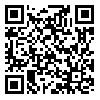BibTeX | RIS | EndNote | Medlars | ProCite | Reference Manager | RefWorks
Send citation to:
URL: http://rehabilitationj.uswr.ac.ir/article-1-62-en.html
Lithium preparations have been used in bipolar mood disorders since 19th Century. Lethal toxic effect of lithium due to it's narrow (therapeutic) index had been known from several years ago and is the most problem when is prescribed. Serum level of lithium is accepted for monitoring of toxicity, but frequency of blood testing especially in stabilizing period is stressful for patients, also it is difficult in such psychiatric patients especially in children. Many researchers worked to find a less aggressive method. One of these methods is monitoring based on salivary lithium concentration, which is controversy according to this review articles. All papers from 1949 till now are reviewed in this article and revealed this controversy. According to this review article, three ways are being suggested to solve this problem 1- Stimulation of salivary – serum ratio of lithium based on tree separated paired tests 2- Improving methods and techniques of testing. 3- Modifying of this ratio based on natural markers.
Received: 12/08/2007 | Accepted: 11/10/2015 | Published: 11/10/2015
| Rights and permissions | |
 |
This work is licensed under a Creative Commons Attribution-NonCommercial 4.0 International License. |





